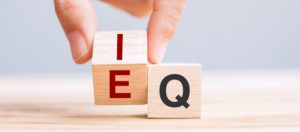 One of the largest myths people believe about personal finance and investing is that it is simply a math formula to be solved. In fact, I would argue one’s emotional intelligence has infinitely more impact on their success in investing than their mathematical intelligence.
One of the largest myths people believe about personal finance and investing is that it is simply a math formula to be solved. In fact, I would argue one’s emotional intelligence has infinitely more impact on their success in investing than their mathematical intelligence.
Psychologist Peter Salovey defines emotional intelligence (EQ) as someone’s effectiveness at recognizing and regulating emotions while solving problems. He has conducted extensive research on the correlation between high EQ and successful investing.
According to the doctor, during times of market volatility, those with high EQ might still be extremely fearful as they see their balances dropping, but are able to rationally assess the emotions they are feeling and recognize that the instincts they have in that moment are likely not what they should act on.
This is no easy task however, especially in times like these. Perhaps that’s why according to financial services market research firm Dalbar, do-it-yourself investors routinely and significantly underperform the market.
If we are indeed headed into a longer-term economic recession, The EQ of investors may be put to the test like never before. The reason I say this is, unlike previous recessions this would be the first one in which the majority of baby boomers are in the retirement phase of their life. This is quite significant because so much of the nation’s total wealth is held by this group of the population.
In previous market downturns, most baby boomers were still working. As a result, while their investments likely performed poorly during those times, it may not have had the same emotional impact on them that a recession today might.
There are several reasons for this. First, boomers have more to lose now. Over the past decade these boomers were likely making more in wages than they ever did before. Many had also likely paid off most debt, and were probably contributing larger portions of their income to their investment accounts. All during an unprecedented 14-year bull run of the market. This increase in net worth often leads to an increase in the fear you might lose it.
Second, the negative performance of their accounts was less obvious during past downturns. Because of the wealth building stage in life these boomers were in, many were making sizeable contributions to their retirement accounts which, if nothing else, helped to keep their balances static even as the holdings in their accounts were losing value. During this recession most will be withdrawing funds from their accounts which only compounds the rate in which their account value is decreasing.
Third and probably most importantly, the mentality of the typical baby boomer was different during past recessions because they were still employed and earning wages. I have had so many clients tell me that, like a light switch, their entire perspective on retirement balances changed the day they retired. One client communicated it this way. While they were still working, the balance of their retirement accounts was more like a score in a game than something real. However, the day they retired that balance became like a countdown clock signifying how much time remained for them living the good life.
This is why it can be very tempting for a retiree to take an account balance number, perhaps the number they had on the day they retired, or even worse a high point in their balance, and make that the floor in which they won’t allow their account to go below. While cognitively the person may know the market can’t always be going up, and market downturns paired with distributions from their accounts are inevitably going to result in a reduction of their overall balance, until they have truly accepted that fact at an emotional level, they risk sabotaging their future success.
This is why I believe the danger of individuals doing the wrong thing with their investments is higher now than perhaps any other time. It’s also why I believe working with a professional is critical, especially once retired. If you are someone on the verge of jumping out of the market, I would strongly suggest you seek the advice of a financial professional you trust. It’s simply too important of a decision to make on emotion alone.
